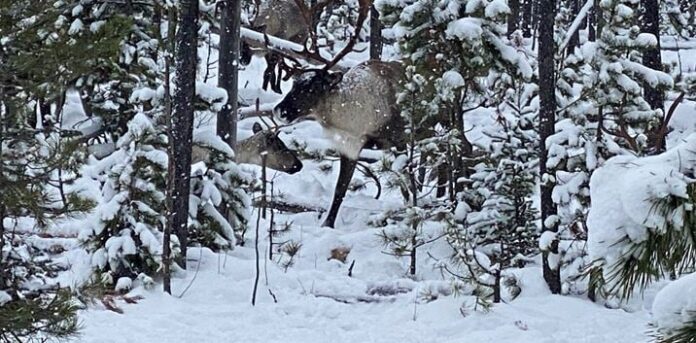Wildsight, along with other environmental groups, is seeking action from Environment and Climate Change Canada (ECCC) to complete a recovery strategy for mountain caribou.
In a letter to the ministry, sent by Ecojustice, the environmental groups are seeking the completion of critical habitat mapping and a recovery plan for the animals, which they feel is over a decade overdue.
The letter states that ECCC’s delays and inaction amount to a “tacit endorsement” of the extirpation of caribou herds
“The ECCC originally promised to identify the areas most critical to the species ongoing survival by the end of 2014, but it has since repeatedly missed and pushed back that deadline,” said Wildsight.
“In the meantime, several of British Columbia’s deep-snow caribou herds have been lost, due largely to the destruction of their habitat.”
Wildsight, Stand.earth and Wilderness Committee has given ECCC until March 19, 2025 to publish an amended southern mountain caribou recovery strategy that identifies critical habitat for B.C.’s deep-snow caribou, which are most at risk of extinction.
“That might sound soon, but those maps already exist—the B.C. government completed critical habitat maps for its herds in 2020—they’re just not enshrined in the federal recovery strategy yet,” said Eddie Petryshen, Wildsight Conservation Specialist.
Wildsight says accurate maps of the caribou’s critical habitats are a key part of helping the declining herds recover as they are needed for effective habitat protection.
The environmental groups say the province still allows logging in sensitive caribou ranges, despite having completed the core mapping.
“Analysis from Wilderness Committee shows 310,120 hectares of critical caribou habitat were logged in B.C. between 2007 and 2023, with 51,313 hectares of that occurring in highly-sensitive core habitat,” said Wildsight.
“A recent investigation by Wildsight and Wilderness Committee showed the province has also permitted logging in ‘no harvest’ ungulate winter ranges.”
Tegan Hansen, Senior Forest Campaigner at Stand.earth says the lack of change has only led to further reduction of animal populations.
“Canada’s inaction has been catastrophic for caribou and the communities where they are so vital,” said Hansen.
“As caribou continue to die out, it’s practically impossible to interpret this government’s failure as anything other than signing off on extinction.”
According to Wildsight, a 2020 study done by the federal government noted that southern mountain caribou had declined by 53 per cent over six years, with deep-snow caribou hit the hardest.
Wildsight says eight of the 18 herds have gone locally extinct within the last 20 years.
“What we are demanding from Canada is not a favour; it is their legal duty under the Species at Risk Act, and right now, they are failing at their job,” said Lucero Gonzalez, Wilderness Committee Conservation and Policy Campaigner.
“Caribou cannot survive on promises and missed deadlines; they need intact, old forests, and they need them now.”
Currently, the ECCC’s timeline for posting an amended southern mountain caribou recovery strategy is 2026, but the environmental groups agree that pressure on the caribou habitat cannot wait any longer.
“This is a new low in the federal government’s poor record of protecting and recovering Canada’s endangered wildlife,” said Ecojustice lawyer Sean Nixon.
“Successive environment ministers have unlawfully delayed for more than a decade taking urgently needed steps under the Species at Risk Act to map and protect mountain caribou habitat.”
Be the first to know! Don’t miss out on breaking news and daily updates in your area. Sign up to MyNelsonNow News Alerts.





